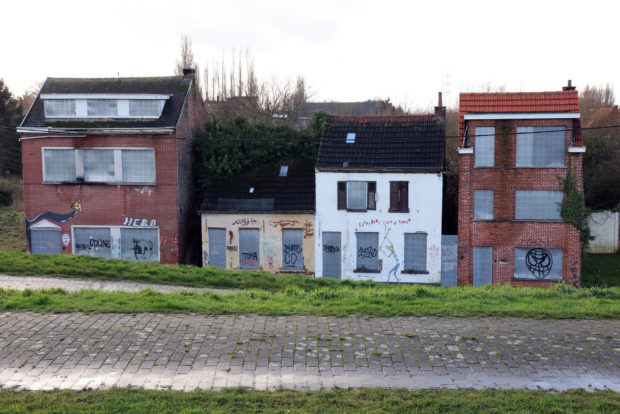Belgium ‘ghost town’ fights to return to life

This photograph taken on January 7, 2022 shows abandoned houses in Doel near the city of Antwerp. – The village of Doel is facing its final battle for survival against plans to expand the adjacent port of Antwerp that will erase it from the map to make way for a new dock in Doel near the port city of Antwerp. (Photo by François WALSCHAERTS / AFP)
DOEL, Belgium — Doel has a reputation as Belgium’s best-known ghost town. But its few inhabitants — today numbering just 21 — now see a glimmer of hope of their village bouncing back to life.
If it does, it would be a remarkable change of fortune for a place that has been steadily emptying out since the late 1970s when its population was 60 times bigger, leaving behind silent streets of crumbling, sealed-up homes covered in graffiti.
Squeezed between Antwerp’s ever-expanding port — the second-biggest in Europe — and a nuclear power plant, Doel has become a morbid attraction for curious tourists and “urban explorers” who film themselves daringly traipsing around inside ruined buildings.
Police patrol regularly to prevent vandals and squatters moving in.
Only two cafes — one attached to a 17th-century windmill — and an immaculate parish church remind visitors that the village still holds out against oblivion.
Article continues after this advertisement“It’s not a ghost town… But if you come here on a Sunday, or especially in the evenings, of course you see the empty houses and that’s what triggers people the most” to think that it looks like one, resident Liese Stuer told AFP.
Article continues after this advertisement“I think it’s very important that people know that it’s not a ghost town, that they know there’s still people trying to live here and trying to set up life,” she said.
Expanding port
Stuer, a 37-year-old teacher of Flemish to foreigners and freelance graphic artist, moved to Doel five years ago when she partnered with a local. But she used to visit as a child with her grandparents, who lived nearby, and remembered it as a swanky town.
But Doel’s fate hit the skids in the late 1990s when Belgian authorities decided to expropriate and bulldoze villages around Antwerp’s port to build a new container dock.
While most inhabitants left, a hardcore stayed and put up a fight in the courts, through fierce lobbying and by promoting street art to give color to the empty houses.
Given the importance of the port to Belgium’s economy, it looked like a campaign doomed to failure.
The regional Flemish government prohibited people moving there and vandalism made the place increasingly insecure for the shrinking population.
But in 2016, Belgium’s supreme court shot down the expansion plan, after the European Court of Justice ruled that it threatened Doel’s marshland surroundings and the ecology of the Scheldt river that runs alongside it.
The nature, and the solidarity that binds Doel’s residents together, are what made Stuer stay.
“The green that we see in the summer: it’s really nice to live here. It’s the place where I want my child to grow up in — the people and environment that I find very warm and welcoming,” she said.
“For me, it doesn’t feel as if I’m isolated. Not at all. It’s a very connected village.”
But it’s still not clear what’s in store, exactly, for Doel.
A town with ‘scars’
Discussions are ongoing between authorities and residents. In December, municipal officials outlined a plan to slowly allow in new inhabitants and renovate a grounded old ship, while building a dock right up to Doel’s perimeter.
The Flemish government, which is now the landlord of all but one of the houses in Doel, is reluctant to see the town return to a population anywhere close to the 1,300 it had in the 1970s.
“We know that the village will not disappear… It indeed has the image of a ghost town, but that’s not how it should be,” the Flemish finance, heritage and housing minister, Matthias Diependaele, told AFP.
But, he said, “we have to look what we can do with it today,” adding: “The most difficult point is the fact that we know for a fact that right next door to it there will be 24/7 harbor activity.”
There is no firm timeline for decisions on Doel’s future, only talk of firming up plans in the weeks or months ahead.
“I really hope they evolve in the direction that Doel becomes a normal village, together with its scars, of course — they will always be visible, the scars of this recent past,” Stuer said, standing in the garden of her house a short distance from the nuclear plant.